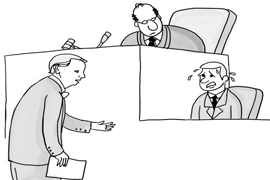By Bhavya Nain[1]

It is a known fact that there are differences between criminal law as given in books and criminal law in practice. This is also true with respect to the field of Cross Examination. Cross Examination is not generally taught in law schools. This is despite the fact that it is essential for any law student aiming to be a criminal lawyer or practitioner. Unfortunately, to add to the woes, there are not many books written by practitioners to come to the aid of law students. In the present article, the author intends to debunk certain known myths regarding Cross Examination. In addition, the author has also elucidated certain basic rules of Cross Examination learnt by experiences.
Myth I: Some say that Cross Examination is all about innate genius of the defence lawyer. It has been the experience that any reasonable and hardworking lawyer can become a good cross examiner through experience and through willingness to learn and decipher the mysteries of the Art of Cross Examination. Cross examination can also be considered to be a learnt Art. There are some basic rules as to cross examination which need to be known. Innate genius cannot help if the lawyer is not in know of these basic rules. For example, never ask a question to which you don’t know the answer. If this basic rule is not followed many damaging answers may be elicited from the witness.
Myth II: Some say that Cross Examination is pure and simple common sense. The rules of cross examination play an important role to establish or demolish the client’s case. Mere common sense does not help. For example, if a novice cross examines and asks open ended questions to the witness, the witness may give damaging answers. Common sense has nothing to do about it.
Myth III: Some say that Cross Examination is good only if there is a melt-down of the witness in Cross Examination. Melt-down of the witness in cross examination happens rarely. The hallmark of a good cross examination is when the defence lawyer is able to demonstrate and establish contradictions and discrepancies in the evidence of the witness. Sometimes, a good cross examiner is even able to get some admissions from the witness. This is the realistic hallmark of a good cross examiner.
Myth IV: Some say that college/ class room study of evidence/procedural law will automatically make the person as a good cross examiner. Unfortunately, the actual rules of the art of cross examination are not specifically laid down under the Indian Evidence Law or the Indian Criminal Procedure Law. This makes the art of cross examination as a secret art because it is passed on from one lawyer to another in closed chambers or court rooms. Cross examination, as a subject, is not discussed in public in India.
To conclude, rules of cross examination need to be discussed as an independent subject in India. This is presently seldom done in law schools. It is necessary that there should be a change in this regard. This will prevent the law students from getting a shock when they find that there is difference in the law taught at the law school and the law in practice. The author will delve deeper into the subject in forthcoming articles.
[1] Advocate, Supreme Court of India; and Former Law Clerk-cum-Research Assistant, Supreme Court of India.

